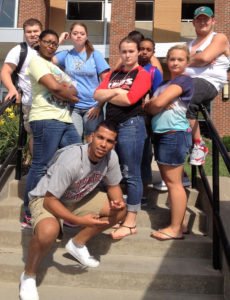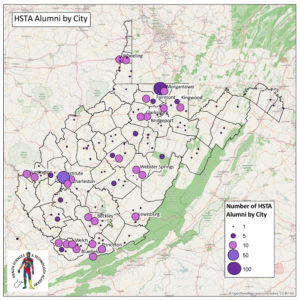By Bethany Hornbeck
By West Virginians, for West Virginians.
That is the claim of the Health Sciences and Technology Academy, known throughout the state as HSTA. HSTA lives up to that promise, as do the young professionals who have come out of the program over the last 20 years.
By West Virginians

HSTA participants graduate from college at twice the rate of the general West Virginia population, and 85 percent of HSTA’s graduates live and work in West Virginia today.
HSTA is a homegrown program focused on STEM education, workforce development and community health. It was established at West Virginia University (WVU) in 1994 to help young, at-risk West Virginians succeed in college, go into health sciences and other STEM-based fields and increase the number of health practitioners and advocates working in the Mountain State’s underserved communities.
Today, HSTA is mostly overseen by volunteer community members in public education, higher education, government, business, nonprofit and thriving STEM-based industries. Dozens of local businesses partner with the program, and, via state legislation, nearly every public college and university makes undergraduate and graduate tuition waivers available to students who complete the program. WVU and other schools—most recently Marshall University, Bluefield State College, West Virginia State University, Glenville State College and Fairmont State University—cosponsor HSTA’s annual science symposia, summer institutes and professional development workshops.
“We were honored to host the southern HSTA symposium last year,” says Marsha Krotseng, president of Bluefield State College. “It’s absolutely energizing to watch the HSTA teams come together from across the region. The research they present in this culminating experience is a testament to the exceptional mentors who help HSTA’s participants achieve more than they ever dreamed possible.”
For West Virginians
Every year, HSTA serves 800 underrepresented high school students, often minority students who are living in rural areas, financially disadvantaged or the first in their families to go to college. HSTA immerses these students in a focused mentorship program that helps them gain the confidence, skills and resources they need to make the leap from high school to college and into the workforce, and the program is phenomenally successful.
Of HSTA’s alumni, 91 percent are currently in college or have earned their degrees, with more than half entering health care and other STEM fields. There are 800 former HSTA students enrolled in undergraduate or graduate school. Another 1,200 are working professionals, employed in medicine, law, the hard and soft sciences, engineering, information technology, industry, education, communications, sports and business, government and nonprofit.
HSTA also contributes to the state as a whole. It has brought federal and private grants into our communities totaling more than $9 million, with current funding coming from the National Institutes of Health, the Claude Worthington Benedum Foundation and the Annie E. Casey Foundation. It conducts health care research in the communities it serves. Through its alumni, it contributes to the diversity, retention rates, community connections and fiscal health of our colleges and universities. It is also developing a workforce from the high potential that already exists in the state—potential often hidden behind Mountain State stereotypes.
“West Virginia is a beautiful state, rich with untapped human potential,” says WVU President Dr. Gordon Gee. “HSTA taps into the wellspring of youth by structuring fun and friends around community problem solving. The majority of HSTA’s former students live and work in West Virginia today, and they show their love for our state by giving back to their communities. This is something they grew up doing. To them, it is only natural.”
 About the Author
About the Author
Bethany Hornbeck is a freelance communications specialist who has worked for 25 years in the private, public and nonprofit sectors. She also serves as the professional development director for the National Association of Government Communicators. Hornbeck recently returned to West Virginia after spending a decade in Pittsburgh and now lives in Grafton with her young family.



